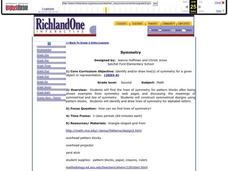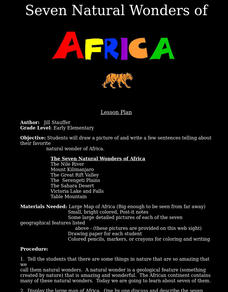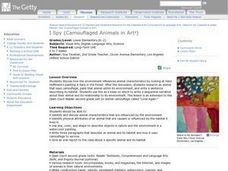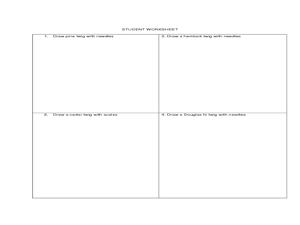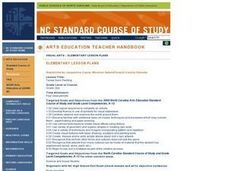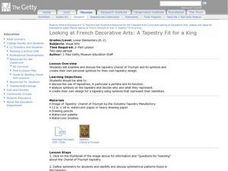Curated OER
A Bug's Journey
Students research the art of John Baldessari. In this art history lesson, students examine Baldessari's drawing of a beetle and discuss the characteristics of these bugs. They write a story from a bug's perspective and create their own...
Curated OER
Giants of the Past
Students create a paper sculpture based on ancient Greek statues. In this visual arts lesson, students read the book, The Mysterious Giant of Barletta and use cardstock to create their own statue. Students write a narrative story told...
Curated OER
Classifying Vertebrates
Second graders study animal characteristics and classification. In this animal characteristics and classifications lesson, 2nd graders determine how to classify vertebrates which include mammals, reptiles, amphibians, birds, and fish....
Curated OER
The Ins And Outs Of Area And Perimeter
Fifth graders demonstrate the concept of perimeter and area using manipulative. In this area and perimeter lesson, 5th graders explore area and perimeter through the exploration style of teaching using eatable and non-eatable...
Curated OER
Children's Book Creations
Students create a children's book version of the Japanese folk story "Momotaro Boy of the Peach" and present the story to elementary students. In this children's book lesson, students design their book to explain Japanese culture to...
Curated OER
Food Chains and Food Webs
Fourth graders investigate food chains. In this living environment instructional activity, 4th graders begin to understand the interdependence of organisms. Students describe the connections organisms have to the ecosystem. Students...
Curated OER
Flexible Thinking- Squiggle Art
Students complete an art creation where they are given a squiggle and have to design a picture around it. In this squiggle art lesson plan, students use flexible thinking, and draw 6 pictures around 6 different squiggles.
Curated OER
Quiet On The Set... Take 1...Action!!
Students complete an activity with the book Step by Step by Bruce McMillan. In this verb lesson, students create a list of action verbs from this book and more to use in their own writings. They will create stick puppets to act out the...
Curated OER
How many isosceles triangles can you find?
Seventh graders recognize the characteristics of isosceles triangles. In this isosceles triangle lesson, 7th graders use geoboards to create isosceles triangles. Students record results and explain why they have an isosceles triangle.
Curated OER
Symmetry
Second graders find the lines of symmetry in pattern blocks and alphabet letters. In this symmetry lesson, 2nd graders discuss what symmetry is, view examples of lines of symmetry and apply what they have learned by finding the line of...
Curated OER
Australian Aborigine Lizard Painting
Students become familiar with Australian "dot paintings." In this Australian Aboriginal Lizard painting lesson, students make illustration of three types of lizards and complete pictures using "dot painting." Students recognize the...
Curated OER
Seven Natural Wonders of Africa
Young scholars draw a picture and write a few sentences telling about their favorite natural wonder of Africa. They discuss the importance of the Nile River, Mount Kilimanjaro, the Great Rift Valley, the Serengeti Plains, and the Sahara...
Curated OER
Data Analysis, Probability, and Discrete Mathematics
Fourth graders analyze the data in a bar graph, pictograph, line graph, and a chart/table and draw conclusions based on the data. They discuss each type of graph, write questions for each graph, and analyze the data as a class.
Curated OER
Ugly Duckling?
First graders identify unique personal characteristics. In this character education lesson, 1st graders listen to the story Ugly Duckling and discuss the changes the animal went through in the story. Students bring in baby photos and...
Curated OER
Stacking the Deck on Nutrition
Learners explore classification. In this science lesson plan, students arrange a variety of foods into their proper food groups. This and other related activities will aid in the development of the learners' critical thinking skills.
Curated OER
I Spy (Camouflaged Animals in Art!)
Make connections about animal characteristics and the animal's environment. In this animal characteristics lesson, students use a piece of art as a springboard for a discussion about animals and camouflage. Students choose an animal that...
Curated OER
Flat Shapes in Three Dimensions
Students examine the 20th-century sculpture "Gandydancer's Dream" by Mark di Suvero. In this visual arts lesson plan, students examine the sculpture and then use flat shapes and wire to create their own sculpture. The students are...
Curated OER
Your Amazing Body
Students examine the different body systems and how they are interdependent on each other. In this body systems lesson students draw the body and its parts.
Curated OER
Comparing Deciduous and Evergreen Trees
Students investigate nature by identifying different plants and trees. For this environmental field trip, students participate in a British Columbia expedition in which they identify cedar, pine, hemlock and Douglas fir trees. Students...
Curated OER
Water Cycle
Second graders investigate the water cycle. In this water cycle lesson, 2nd graders discover how the water cycle effects erosion and weathering. Students create their own terrariums to view the water cycle. Students illustrate their...
Curated OER
Tansai Sumi Painting
First graders study Japanese art and apply the technique of Tansai Sumi (lightly colored) to create individual works of art. Painting, design, lines, and drawing techniques are covered in this 1st grade lesson.
Curated OER
Bubbles
Students observe the characteristics of bubbles. In this scientific inquiry lesson, students use a bubble solution and a wand to make bubbles and observe their characteristics. Students identify the shape and the color of the bubbles.
Curated OER
Chariot of Triumph
Young scholars examine the tapestry "Chariot of Triumph." In this symbolism lesson, students analyze the symbols in the tapestry and what they represent. Young scholars create their own design for a tapestry by using various symbols that...
Curated OER
Making Healthy Food and Activity Choices: Putting the Pyramid Together
Students work with the Food Guide Pyramid. In this Food Guide Pyramid lesson, students draw a large rendering of the food pyramid on a piece of butcher paper. They cut out pictures of foods and place them on the food pyramid, they play a...









